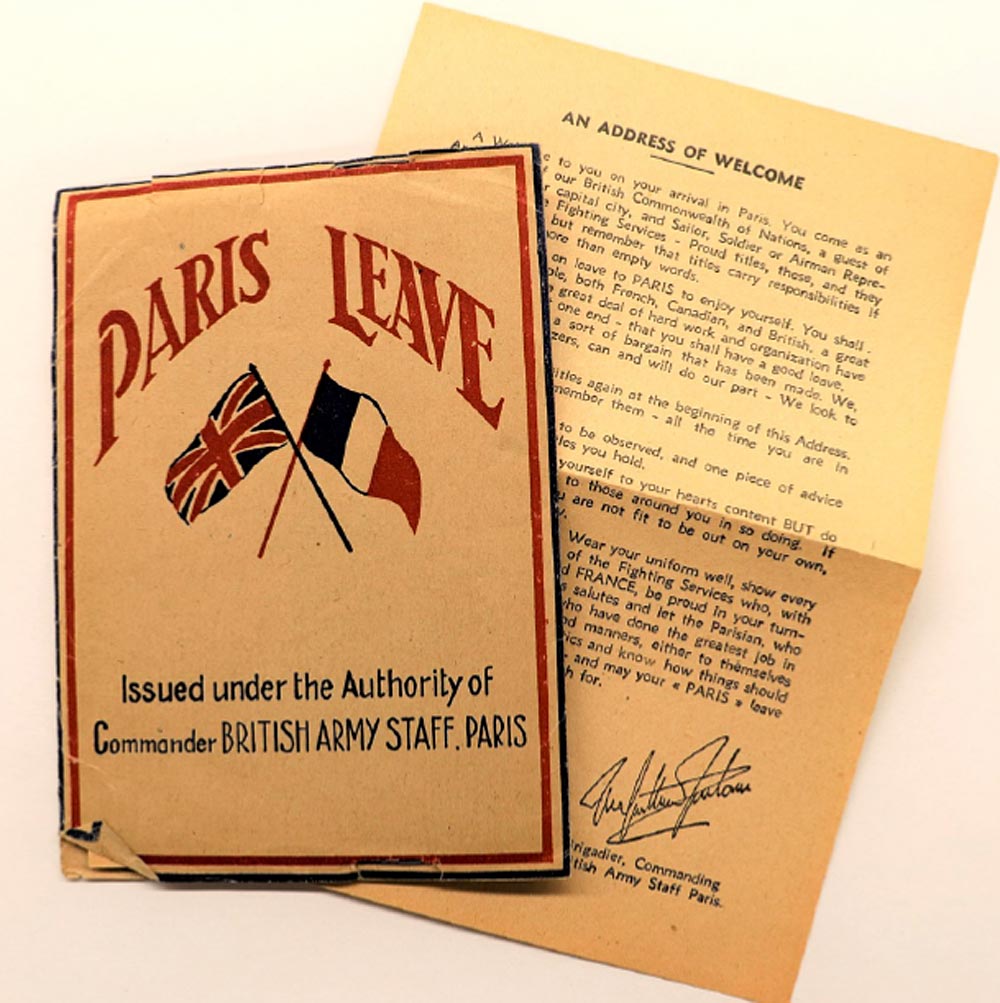
Venessa Léger
Stag Special
While sifting through our archive collections, RCA Museum staff came across a peculiar artifact dating back to the Second World War — a British Army-issued information booklet given to Allied soldiers on leave in Paris, France.
Tourism was common during both world wars, and the constant stream of soldiers on leave facilitated this industry. After the liberation of Paris in August 1944, Allied troops replaced the Germans in the city and began to visit the capital of France as tourists.
The “Paris Leave” handout, dated November 1944, and signed by Brigadier Carthew-Yorston of the British Army Staff in Paris, contains small, neatly-folded, yellowed sheets of paper: a welcome message, an important notice, directives on the Forces Information Centre, addresses of hostels, clubs and restaurants to visit, exchange rate information as well as a map of Paris.
The leaflet directed visiting soldiers towards Expeditionary Force Institutes (EFI) and American Expeditionary Force (AEF) establishments. Said institutes were part of NAAFI (Navy, Army and Air Force Institutes), devised by the British after the First World War to provide catering and recreational services to soldiers. They included shops, restaurants, bars, and clubs.
The Canadian military prohibited soldiers from buying food in civilian restaurants while on leave to keep any profits within the organization. The troops also benefited from free accommodation and meals at sanctioned hostels, and Allied service personnel wearing their uniform could even get free entrance to cinemas and theatres.
One of the pages provides the addresses of both a British and Canadian Forces information centre, an important stop for soldiers wanting any information on touristic activities in Paris, the train, bus and metro services, as well as news from the home and war fronts.
The “Exchanges” page features French francs exchange rates for British, Belgian, Dutch and German currencies. During that period, paymasters would remunerate Canadian soldiers in British pounds converted from Canadian dollars.
What is most striking about the booklet is its overtly cautionary tone in the welcome address. The message reminds the soldiers of their proud military status and counsels them to act accordingly. The rule they must obey: “[e]njoy yourself to your heart’s content BUT do not make yourself offensive to those around you.”
It is reminiscent of a teenager’s parent warning their young one before going out for fun. Likewise, the page titled “Important Notice” cautions soldiers about the threat of venereal diseases, or VD for short — now better known as sexually transmitted infections or STIs.
The notification strongly advises soldiers against visiting brothels and warns them about the risks of consorting with “enthusiastic amateurs welcoming the liberation troops with special favours.” The message goes on to say “alcohol makes men wise fools” and to look out for themselves and their fellow soldiers while under the influence.
Today, Canadian soldiers will certainly receive information when travelling, but not in the same form as the “Paris Leave” booklet. With the advent of the Internet, it is much easier to access up-to-date travel and tourist information.
One thing remains unchanged, however, the inherent responsibility held by soldiers. Whether going on exercise nearby, overseas or on leave, senior leadership will always brief their members on the do’s and don’ts of soldier conduct.

